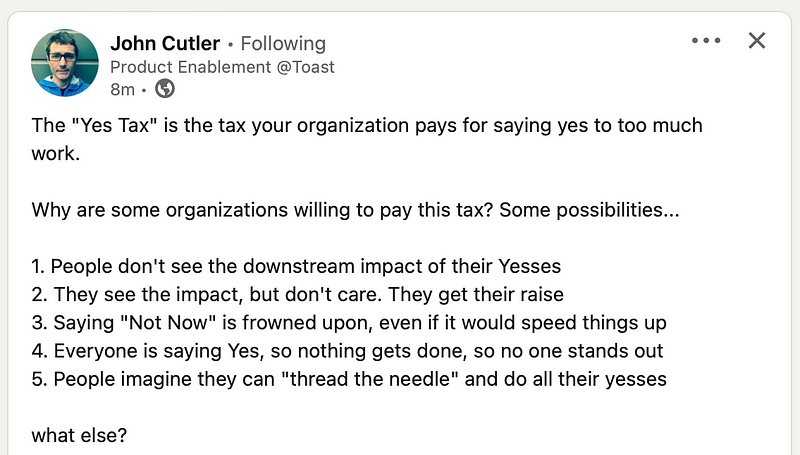
Don’t Leave Things Hanging
Why never finishing will leave you a worse person and worse off.
Being indecisive and/or wracking up heaps of unfinished work are two things that can send you into a tailspin. On this note—and on the occasion of going on summer vacation—I want to share two scenarios, one every-day, and one for those of you doing creative work.
There are real and bad consequences by leaving things hanging; undone, unfinished. And it’s something we somehow tend to do a lot, and somehow it’s become accepted. I’m not taking it anymore! Yet I’m as culpable as everyone else once in a while.
Emails never get replied to. Washing isn’t done and clothes stack up. Projects never materialize. The examples are endless, from the mundane to the very private expectations we have on ourselves.
Let me start with a very simple, real scenario to set the scene.
The non-reply; countered by decisiveness
I recently emailed a new colleague about (what should have been) a routine matter—vacation coming up for pretty much the entire country adding further tension to my communicative need—and needing a quick, clear reply on this particular question because of an external party who in turn needed an answer for a new project we are doing. Nothing strange so far.
The answer took time—several days in fact—and didn’t really respond to the problem at hand. I replied back, providing my full cooperation and making myself available. This needed to be done and the way to do it is to be available because this whole matter had “non-completion” written all over it.
Still: No reply for days. The external party gets a bit wound up too. I do my best to “hack” the calendar’s meeting availability feature: It seems the colleague is already on vacation?! And of course, not a single word about this in our last correspondence. 🤯 I was left dangling in a vacuum.
Note that I’m not here to make a fuss about this specific incident; it’s not all that interesting on its own. With this general scenario as a backdrop, though, I believe many can relate to being put in a waiting game. My world was not shaken apart, and I (nor the external person) lost anything significant in this delay. This time…
But let’s now take this behavior in a grander, ethical scope as a behavior that many of us do to the possible, significant detriment of others.
There is a real problem here: The unfortunate fact is that someone else made a decision (even a non-decision is a decision) to not “finish” the conversation and close the loop. Trivial or hard doesn’t matter—someone else made the call to let you wait and hang you out to dry for a bit. The thing is, everything else that depends on that response comes to a standstill. And the more complex the chain of people and processes to pass through, the lower the realistic survival rate of the full process ending in quantifiable results becomes.
That indecisiveness is a tangible blocker, and you are sometimes responsible for creating it.
Indecision, especially in already bad organizations, kill just about everything. Most of us can’t do much about a poor org, but we all can be more decisive.
What about time, then? What if there simply wasn’t any time to reply? Clarity “gives” people time. Write what you actually want succinctly, provide details as needed, and end-cap with a clear question (or similar, depending on context). Make it dead easy to respond to your email. This particular email followed those principles, yet here we are…
If you think about it, there really aren’t many options available in most circumstances. You receive a question (inquiry, ”ask”, mission, task…) and can:
- Provide an affirmative response. You have authority and approve of it.
- Provide a negative response. You have authority and you disapprove of it.
- Defer in time. This is not the time. Acknowledge that you’ve received the question. Make sure to understand how important and urgent a decision is if you are to defer something so you can respond in a sensible timeframe.
- Defer to another person. Appropriate delegation is a trait of competent leaders; someone else is better suited to make the decision.
- Say you don’t know or back out. Someone else knows better than you. A perfectly valid option.
If you are short on time, you can answer all of the above with less than 10 words. That’s less than 20 seconds of work. Time is not a real problem, so stop kidding yourself.
How do you know you are on the right path? Some things could be:
- People are happy with your resolve and responses.
- They come to you because they trust and value your decision-making abilities.
- You have an empty inbox.
- You have more (recent) work finished than unfinished.
- You can quantify and qualify the things you’ve done.
- You can explain the decisions you’ve made to your grandmother.
It shouldn’t be too hard to turn that around and see what it means when you are poor at deciding.
It’s said that wine that is good today can be aged to become even better with time, whereas code always ages like milk, becoming spoiled pronto. We can simplify this to the following maxim:
Only wine ages like wine, the rest just goes rotten. Eat it now or throw it away. You can’t refridgerate decision-making and still win in the big game.
“Bad people” love to leave things hanging, like dictators, despots, evil businesses, and so on. This is a power move that is done only on their conditions and only for their gain. Don’t be a bad person.
In summary: Be decisive, because it’s a lot less hard than ignoring things. You might even make friends and earn the respect of your elders who had real jobs.
In this case, the “price paid” for all three parties became something looming unfinished over the entire vacation period. However, this time I am the one taking the brunt of the toll, as my situation will be somewhat worse in a discussion after summer.
So, why is it that we leave things, as if they can (or should) just disappear?
The unfinished project; countered by committing and executing
While I was in a Master of Fine Arts program many years ago, I saw how some of the painters worked. For me, who works mostly digital (and not with oil paintings), seeing their work process was fascinating. They would alternate between working close-up and working at a distance. Because oil takes such a long time to dry, they would also have to be very strategic about how the paint is applied layer by layer. There was something here that made a lot of sense, about how to move between the details and (literally) the bigger picture.
Funnily, I got the impulse to nerd on some old Caravaggio stuff a couple of years ago.

As much as I enjoyed nerding on this — and a faint impulse told me to start painting (I didn’t) — I understood immediately this would be an enterprise bound to fail. Oil painting has a low tolerance for failure, and takes immense patience. And lots, and lots, of time.
How did these painters learn? By drawing, drafting, painting, and doing it over and over again, over many years. This explains why painters in Swedish MFA programs (and probably elsewhere too) have already been studying at art schools for something like 10 years before getting into that level of program.
If I would have done it, I’d be surprised if the age-old concept of precisely those things around endless training and failure would somehow not apply to me as well.
Nothing beats doing the work to actually learn.
Also, a reminder to not go into a self-induced psychosis and imagine I’m a painter when I’m clearly not doing the work. That’s why they have the Brian character on Family Guy.
Now, picture this:
Your pet subject to bring up at dinner — “oh, I’m working on this new thing” — has been recurring so often that today someone reached the point where they asked you, politely, to just shut up already as there has never been any evidence of this “new thing”. As much as it hurts, you know it to be true. The story is the same today as it was the last time you told it. And the time before that…
You’re busy being busy. Because you do spend time on it. But it doesn’t lead to much of anything. The bureaucracy of the work somehow seems more enticing.
Sometimes this tendency goes as far as people burning out, many times with just about nothing to show for it. Burning out from busy-work, rather than from busy work. It’s got to be the saddest thing that could happen to anyone. Like being stuck in the interstices of a multitasking brain with attention deficit disorder. Pure switching costs draining your life and sanity away.
Certainly, you might—say working on your pet project—feel like “you know what, screw this”. And if that’s the case, then you should! But then, at least package it appropriately.
If I’m doing something with code, I’ll see if I can just add some documentation or pointers and put it on GitHub or as a Gist. I’ll make sure that even if this doesn’t do what I wanted/expected it to do, I can well and truly mark this as a finished activity. The bar isn’t lower, it’s different. Things have changed and that’s OK.
“Finished” might not entail exactly what I expected at the start, but it’s finished in the proper sense of the word. If I, or someone else, looks at the stuff then they’ll see something that is complete in the sense of being a logically cohesive thing. I’m a simple man; I can be satisfied with that—at the very least it’s a notch on my wall of things I’ve done and learned.
If the thing’s so insignificant, or if I start having actual abject feelings about the project, then just plain deleting it (or similar) there and then is a fine option too. But I won’t keep it around, either as paper or code or anything else.
Gone is gone, no need to look back. Don’t be nostalgic over your unfinished work!
I don’t want to inhabit a museum of true failures: Things that were non-starters, incomplete, false starts, incomprehensible Frankensteins, something where no learnings are yet uncovered... I would be much happier building a record of things I did and learned—some as expected and others not so expected.
It’s a truism that failure is also a (strong) kind of learning, but the hard truth is that most people just really hate dropping a project or failing at it. I’m pretty sure the fear of not completing something is the number one reason why someone wouldn’t ever start their dream project or whatever it is. (It doesn’t explain why you wouldn’t answer an email though.)
When you complete something, you enter a state that’s different from the “production” phase. Now it’s time to reflect, package, and deal with the learnings. It’s incredibly powerful to wrap up a project. I’ll often have to write some better docs and imagine an audience that’s not myself. The code needs to be in good order for someone else to see it (or myself, in a possible future timeline).
If you just drop something without even blinking, then you’re hard-pressed to meaningfully enter this more reflective stage. Well, I suppose you technically could, but it would be so close to what I’m arguing for that there is no meaningful distinction. That type of reflection and closure is key to your learning. Given the number of fields I’ve been in and the amount of work I’ve left behind, I think it’s safe to say it at least worked for me.
I’m no self-help guru, I’m just your regular guy on a blog. Don’t trust me, if you don’t already. However, as far as I’ve experienced, the secret underlying a change to the above ordeal is to be incredibly selective. This thing about obligations — from society, friends, family, colleagues, culture, whatever — is the frontier in which you will have to simply be an asshole to get ahead with your plans. Even the Jeff Bezoses of the world only have 24 hours a day.
To be completely frank, I’d much rather see myself — and you! — get some daily exercise, enough quality sleep, a bit of sun and air, and feel like you can be your creative best than have to deal with expectations from anyone else. You can’t get the things done that you really want if you place equal energy into any number of other things.
Start saying “no”. It’s the only legal form of magic readily available today.
A great colleague of mine gave me Derek Sivers’ book Hell Yeah or No this last Christmas. I’m happy to recommend it. The book is great, dirt cheap, and an easy read. As with any book, it won’t change your life — after all, only you can change it — but I felt right at home reading it. And of course, Sivers put that great line front and center of something I’ve intuitively felt for a long time: “Hell yeah” or just a “no”. There truly is no in-between state.
The “yes tax” is very real, tangible, and expensive.

Finishing might therefore equate to saying “no” a lot more often than you initially feel comfortable with. But it’s the price you pay to finish and not leave things hanging.
And to be honest, completing something regularly, where you learn from each attempt, is a whole fucking lot more than most people do even at their peak. Just check how many sources versus forks most developers have under their names; don’t be surprised when you see most committing essentially no original code, but forking a lot of stuff. That’s not completed work, it’s just (at best) manifest curiosity.
The “HumanGPT version” (i.e. myself), brought up on Jocko Willink and Derek Sivers, would probably boil this rant down to:
- Select: Rate of “yes” should be the response to no more than 1–10% of all provided options.
- Commit: Everything you actually do, you do to your full ability.
- Execute: You always go until completion, and completion criteria may change during the way.
Three simple verbs, with the counter-point simply named no.
Not too hard, even I can remember this.
So…
To summarize, we come out of this reflection with:
- Tools to better make decisions;
- Understanding the bad snowball effects of indecision;
- Understanding that only you set the boundaries of a piece of work (i.e. you can’t fail, as long as you wrap up, reflect on learning, and put it away in the annals of your history);
- That you are better off being more discerning in your selection of activities;
- That anything you do should be done to (your level of) completion.
I like this approach. It’s worked really well for me.
Maybe it will be good for you too.